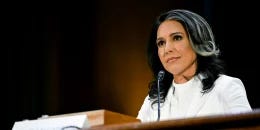Tulsi Gabbard Faces Growing Scrutiny Over Nomination After Difficult Confirmation Hearing
Her Refusal to Address Snowden Question Directly Sparks Concern Among White House and Senators
WASHINGTON — Tulsi Gabbard’s nomination to serve as the Director of National Intelligence is facing increasing uncertainty following a confirmation hearing this week that raised questions about her qualifications. Even some Republican senators are now openly questioning her suitability for the position, according to multiple sources familiar with the situation.
A key point of contention during the hearing was Gabbard’s response to a direct question about Edward Snowden, the former National Security Agency contractor who leaked classified information and sought asylum in Russia. When asked whether she considered Snowden a traitor, Gabbard refused to provide a clear answer, instead emphasizing her commitment to the U.S. Constitution and national security.
“The outcome of her confirmation is now uncertain, with estimates at 50-50,” one person involved in the confirmation process shared.
With Senate Democrats expected to unanimously oppose her confirmation, Gabbard can only afford to lose the support of three Republican senators to secure confirmation. Many in the White House, concerned by her performance, expressed unease over her failure to directly address the Snowden issue. A senior official noted that President Donald Trump was particularly concerned, wondering aloud how her evasiveness would affect her chances.
During her hearing, Gabbard was grilled by senators from both parties about her past comments in support of Snowden and her suggestion that he be pardoned. In her exchange with Sen. James Lankford (R-Okla.), she avoided calling Snowden a traitor, instead stating, "I’m focused on the future and how we can prevent something like this from happening again." This lack of clarity led to significant pushback.
Ahead of the hearing, the White House privately recognized that Gabbard had a lot of work to do to win over skeptical senators. Despite extensive preparation for the confirmation, including mock hearings, Gabbard’s handling of the Snowden question created doubt in Washington.
In response to concerns about her nomination, White House Press Secretary Karoline Leavitt reiterated President Trump’s support for Gabbard, stating, “President Trump nominated Tulsi Gabbard because he believes she will do an excellent job as the Director of National Intelligence, and we expect the Senate to confirm her.”
Despite these assurances, Republicans on the Senate Intelligence Committee were divided. Sen. Susan Collins (R-Maine) pressed Gabbard on whether she would advocate for clemency for Snowden if confirmed, to which Gabbard responded that she would not. Collins later expressed satisfaction with Gabbard’s answer.
Meanwhile, Sen. Josh Hawley (R-Mo.) voiced concerns about the nomination’s viability, noting, “I am worried that her nomination may be in jeopardy.”
With the confirmation vote looming, Republicans hold only a narrow majority on the committee, and Gabbard’s prospects remain in doubt. The committee’s decision could move her nomination to the full Senate, where support from key Republican senators will be crucial.
Some Republicans, like Sen. John Cornyn (R-Texas), have expressed tentative support for Gabbard after her hearing performance. However, others, including Sen. Lankford, have yet to commit, leaving Gabbard’s confirmation hanging in the balance.
In the coming days, Gabbard’s team will continue working to secure critical votes, with the White House, Republican allies, and Gabbard herself focusing on addressing concerns and rallying support for her nomination.


